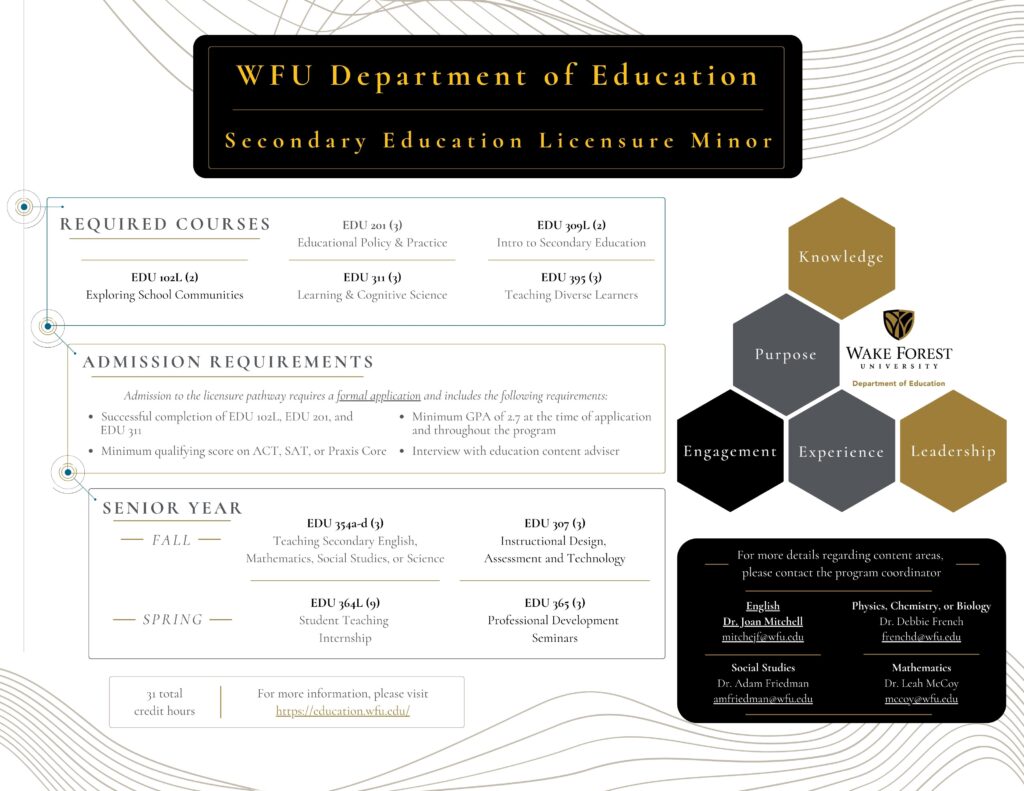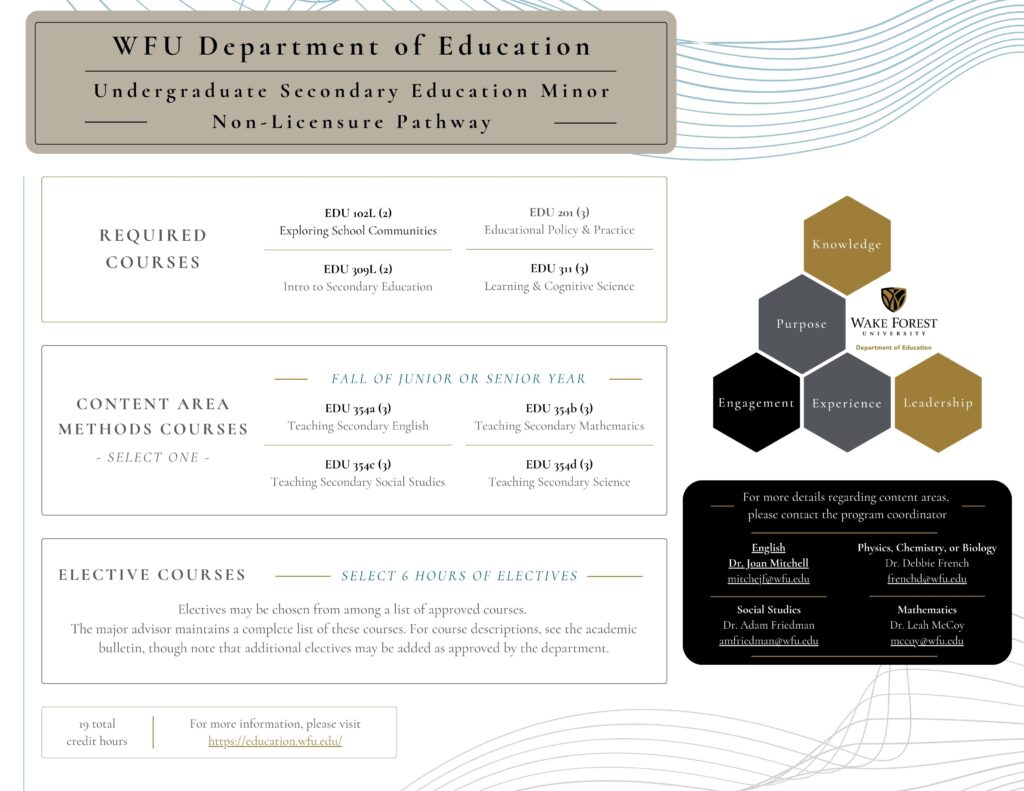Secondary Education Minor
Program Overview
The secondary education minor offers two pathways in the content areas below: (1) a 31-credit hour professional licensure pathway that includes a full-semester student teaching internship and (2) a 19-credit hour non-licensure pathway where students substitute fewer elective courses in lieu of the student teaching internship.
Prospective English teachers will major in English (or take equivalent coursework) and minor in Secondary Education.
English Content Requirements
33 hours, including:
| ENG 265 | British Literature before 1800 | 3 |
| ENG 266 | British Literature 1800 to the Present | 3 |
| or ENG 275 | American Literature | |
| ENG 290 | Foundations in Literary Criticism | 3 |
| Select at least one 200-300 level writing or creative writing course | ||
| Select at least one 200-300 level course matching the following criteria: | ||
| Pre-1800 Literature | ||
| American Literature | ||
| Shakespeare | ||
| Multicultural or World Literature | ||
| Linguistics or Grammar | ||
| Poetry, Theatre/Drama, or Film | ||
For more information, please contact Dr. Joan Mitchell,
English Education Program Coordinator.
Prospective mathematics teachers will major in Mathematics (or take equivalent coursework) and minor in Secondary Education.
Mathematics Content Requirements
33 hours, including:
| MTH 112 | Calculus with Analytic Geometry II | 4 |
| MTH 113 | Multivariable Calculus | 4 |
| MTH 117 | Discrete Mathematics | 4 |
| MTH 121 | Linear Algebra I | 3 |
| MTH 321 | Modern Algebra I | 3 |
| MTH 331 | Geometry | 3 |
| MTH 357 | Probability | 3 |
| or STA 310 | Probability | |
| Select three other courses beyond MTH 113 | ||
For more information, please contact Dr. Leah McCoy,
Mathematics Education Program Coordinator.
Prospective science teachers will major in Biology, Chemistry, or Physics (or take equivalent coursework) and minor in Secondary Education.
Science Content Requirements
Licensure in the individual fields of science: biology (34 hours), chemistry (34.5-35.5 hours for BA), and physics (25 hours). All courses must be from the same courses required for majors in those fields.
For more information, please contact Dr. Debbie French,
Science Education Program Coordinator.
Prospective social studies teachers will major in History (or take equivalent coursework) and minor in Secondary Education.
Social Studies Content Requirements
30 hours, including:
| History | ||
| Select six hours from European or World History | 6 | |
| Select six hours from U.S. History | 6 | |
| Select six hours from Non-western History | 6 | |
| Social Sciences | ||
| Select one course from Economics | 3 | |
| Select one course from Geography | 3 | |
| Select one course from Political Science | 3 | |
| Select one course from Anthropology or Sociology | 3 | |
For more information, please contact Dr. Adam Friedman,
Social Studies Education Program Coordinator.
All students minoring in secondary education must complete the following core education courses.
Core Education Courses
- EDU 102L: Exploring School Communities (2 hr)
- EDU 201: Educational Policy and Practice (3 hr)
- EDU 309L: Introduction to Secondary Education (2 hr)
- EDU 311: Learning and Cognitive Science (3 hr)
All students minoring in secondary education will also take one content pedagogy course in their respective field.
Content Pedagogy Course
- EDU 354A: Teaching Secondary English (3 hr)
- EDU 354B: Teaching Secondary Mathematics (3 hr)
- EDU 354C: Teaching Secondary Social Studies (3 hr)
- EDU 354D: Teaching Secondary Science (3 hr)
Secondary Education Minor
(Professional Licensure Pathway)
Students interested in teaching high school (grades 9-12) English, mathematics, science, or social studies will complete the 31-hour undergraduate licensure minor and a content area major (or equivalent coursework) in their respective field. Upon graduation, students will be recommended for a North Carolina teaching license.
Teacher education candidates will successfully complete a series of professional education courses. The exact sequence of academic courses and professional field experiences will vary by content area and will be determined in conference with the student’s content area program coordinator.

Along with the core education courses listed in the Program Overview section above, students will also take the following required courses.
Required Courses
- EDU 307: Instructional Design, Assessment, and Technology (3 hr)
- EDU 395: Teaching Diverse Learners (3 hr)
The final student teaching internship semester usually occurs during the spring of senior year and includes two courses.
Student Teaching Internship
- EDU 364L: Student Teaching: Secondary (9 hr)
- EDU 365: Professional Development Seminars (3 hr)
Admission to the licensure pathway minor includes the following requirements:
- Major declaration through the University Registrar’s Office
- Teacher education application
- Successful completion of EDU 102L, EDU 201, and EDU 311 with a minimum grade of C in each course
- Minimum qualifying score on ACT, SAT, or Praxis Core
- Minimum GPA of 2.7 at the time of application and throughout the program
- Recommendation from Secondary Education Content Area Program Coordinator
The formal application, submission of supporting documentation, and completion of these requirements must be completed by April 1st of the junior year.
There are minimum requirements for undergraduate licensure programs. On rare occasions, when applicants do not initially meet all requirements and are advised to delay the application or seek irregular admissions, they must write a request and receive written permission for formal acceptance by a faculty committee consisting of the department chair, graduate program director (if applicable), and secondary education faculty. All licensure program requirements must be met prior to graduation.
After the application materials are received by the Department of Education, candidates will receive a letter stating the decision on their application. There are three responses: formal acceptance, rejection, or acceptance deferred. The deferred decision includes the conditions for formal acceptance.
Prerequisites for registering for student teaching include (1) senior, graduate, or special student classification; (2) completion of all preliminary education courses; and (3) formal admission to the teacher education program.
Students are assigned to a student teaching placement by their content area program coordinator with approval from public school officials based on the professional needs of the student and the public school system. The student’s final semester at the university is generally reserved for the student teaching internship and related courses. Students may not take courses outside of the Department of Education during this semester without prior approval from the department chair.
Graduation requirements for professional licensure candidates include:
- A minimum grade of C in each course attempted in education
- At least a 2.7 GPA while enrolled in the Teacher Education Program
- Submission of qualifying scores on the appropriate edTPA performance-based, subject-specific assessment
- Additional requirements for candidates to be recommended for professional licensure include passing all appropriate state-required standardized tests.
The North Carolina Department of Public Instruction issues the Professional Class A Teaching License to graduates who have completed an approved program, including the specified courses in their teaching field(s) and the prescribed courses in education. These graduates must also demonstrate mastery of specific competencies and receive recommendations from the designated official(s) in their teaching area(s) and from the Licensure Officer. Additional information about teacher licensure can be located through the Teacher Licensure Office.
For more information about the Secondary Education Program at Wake Forest University, please see the Secondary Education Handbook.
The Secondary Education Licensure Pathway Minor is proud to meet rigorous state and national standards for educator preparation. We are fully accredited by the North Carolina Department of Public Instruction (NCDPI) and the Association for Advancing Quality in Educator Preparation (AAQEP).
Secondary Education Minor
(Non-licensure Pathway)
To declare the Secondary Education Non-licensure Pathway, students must be majoring (or have equivalent coursework) in one of the following academic majors:
- Biology
- Chemistry
- Economics
- English
- French
- German
- History
- Mathematics
- Physics
- Politics
- Sociology
- Spanish
- Statistics
The Secondary Education Non-licensure Pathway is perfect for undergraduate students with an interest in teaching and/or grades 9-12 education but who do not plan to student teach or pursue a teaching license as an undergraduate. This 19-credit hour pathway is different from the licensure pathway in that it does not require a full-semester of student teaching and related coursework and therefore does not lead to a North Carolina teaching license.
This pathway is optimal for students whose schedules are limited due to studying abroad, double-majoring, participating in collegiate athletics, and/or will be seeking a teaching license as part of an initial licensure Master’s program after graduation.
There is no formal application to the Secondary Education Non-licensure Pathway. For more information about major/minor declaration, see the University Registrar’s Office.

Along with the 13 credit hours of core education courses listed in the Program Overview section above, students will also 6 hours of education electives. Elective courses may be chosen from among the list of approved courses. Additional elective courses may have been approved since publication of the academic bulletin. The major advisor maintains a complete list of all approved elective courses. For course descriptions, see the course listings in the academic bulletin.
Wake Forest University believes that the teaching profession is important to society and that society’s welfare is significantly affected by the quality of educational leadership. One of the important objectives of the university has been and continues to be the preparation of teachers and other professional school personnel. The university’s commitment to quality in teacher education is demonstrated by selective admission to the program, a wide range of academic courses, and closely supervised field experiences appropriate for the professional needs of all students.
For general inquiries regarding the secondary education program,
please contact Dr. Joan Mitchell, Director of Secondary Education.
